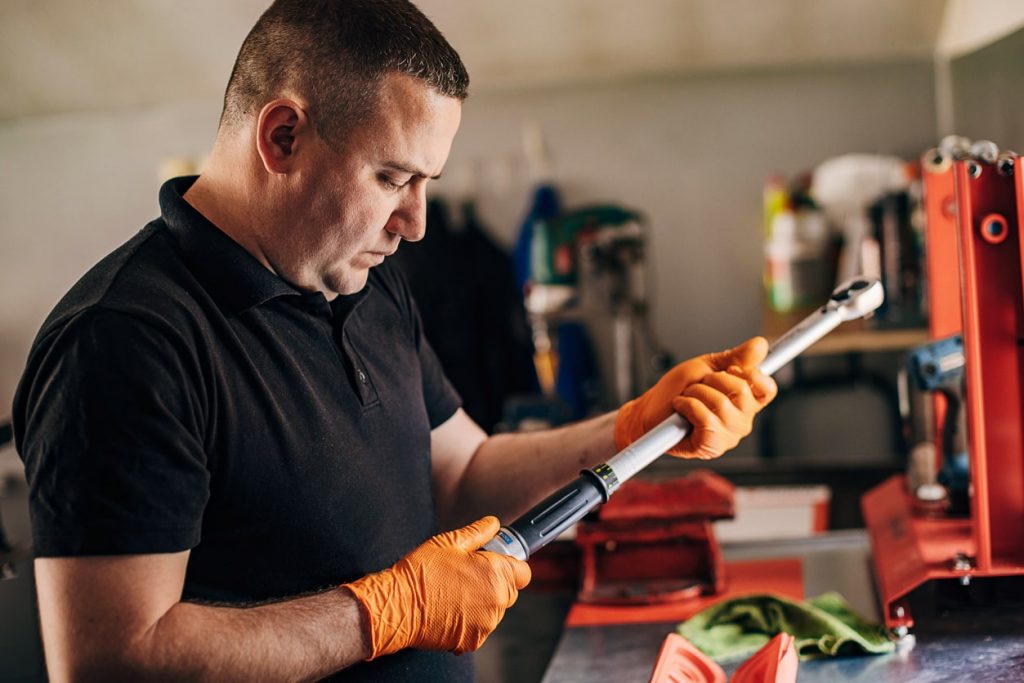Are you looking for some sturdy protection for your hands while you fight the grease and grime?
Skilled mechanics may not mind getting their hands dirty, but it is not good to expose your hands and skin to these chemicals in the long term.
Most of the mechanics now opt for special latex gloves or disposable nitrile gloves.
Scientists design and create the protective gears carefully after thorough research.
Protection for hands is critical
Working below the car hood or on the shop floor, mechanic gloves are special shields for their hands.
Some mechanics don’t like to wear gloves to feel the elements directly and detect the problems.
They do not use gloves but then wash their hands using special cleaning liquids, which can leave the skin damaged.
Some of them may feel that disposable nitrile gloves are the answer to their woes, and at the same time, latex gloves are also designed to protect against harmful chemicals and dirt.
What type of gloves are suitable for mechanics?
This is a difficult choice as there are a variety of gloves available in the market and each has some great features and some negative aspects.
Our research and comparison on nitrile versus latex gloves will help you choose the right ones for the kind of work you do.
The basic aim of any glove is to protect the hands from any harm or injury.
We will first discuss the features of both varieties of gloves. Then you can also see what the experts say about both.

Difference Between Nitrile and Latex Gloves
Both kinds of gloves are created to provide the requisite protection to the hands.
The differences in their material and the level of protection can decide their efficacy.
The gloves using modern techniques and mechanics can use either kind, based on their work.
Let us see some of the main differences between the two-
1- Material
The latex gloves use the natural sap from rubber trees. The manufacturers combine protein and lipid-rich sap and many other chemicals to make a myriad of rubber products that we use in every industry.
The rubber is flexible and, at the same time, is hard enough not to react with many chemicals used in the manufacturing industry, making it an excellent protective barrier for the skin.

Nitrile butadiene, which is a synthetic polymer, is the main ingredient for nitrile gloves.
There is a coat of chemicals on the material to make it friction-resistant so that mechanics can easily remove the gloves, water and chemicals do not stick to the surface.
2- Chemical Resistance
Resistance to Chemicals- Mechanics deal with hazardous chemicals for the most part of their day.
The gloves need to be resistant to the same to protect the hands. You must research well to find out the glove material that can withstand chemicals and strain in your line of work.
The nitrile gloves have a copolymer that makes them inert against most chemicals.
Some studies have suggested that nitrile gloves are resistant to more chemicals than latex gloves.
Usually, you can use disposable gloves only once, limiting their exposure to harmful chemicals.

3- Water Resistance
Both kinds of gloves are water-resistant. The gloves protect against most liquids and water. This is especially important when a mechanic is working with coolants and cleaning liquids.
The material does not allow fluids to stick to the surface.
There may be some issues with dampness and a moist environment, though the gloves may leave the palms sweaty when a person sweats more.
Whether nitrile or latex, the gloves will keep most fluids away from the hands, but the insides may become damp.
4- Inner Lining
This is where the fleece lining comes in handy. The nitrile gloves do not have a lining. The latex gloves designed for mechanics may also add a fleece lining to absorb the sweat and dampness to make the user comfortable.
5- Allergy
An important aspect is the allergy factor. Some mechanics are allergic to latex, and they avoid using these gloves, fearing the severe symptoms.
To be honest, a few are allergic to nitrile gloves too, owing to the rubber accelerators in the material.
However, nitrile may be a better option for most mechanics to avoid allergic reactions, looking at the convenience and protection.
6- The Fitting
The latex gloves fit snugly. This helps the movements of fingers, and after some time of use, the user does not even feel the protective layer.
The nitrile gloves have changed over the years to fit the shape of the hands and fingers now.
The nitrile gloves are thinner and yet strong too. Mechanics can use their mobiles and the tools needed in their work easily.
The sensitivity to touch is essential for mechanics in their trade, and both gloves have similar features.
They can easily hold small objects and hold the tools with a good grip.

7- Durability
The gloves should be protective enough against small tears and damage.
Nitrile gloves are thicker compared to latex and are more durable due to their sturdiness.
But it is also essential to ensure that the tear is visible and helps the mechanic discard the same.
8- Easy Donning and Doffing
The gloves should be easy to wear and take off. You must not use the same gloves repetitively due to contamination, wear, and tear.
The latex gloves have a layer of powder inside that helps the gloves to be worn and removed easily.
It is usually cornstarch, and that can also be irritable for the skin.
At the same time, nitrile gloves have a coating that reduces friction and removes the need for powder.
9- Affordability
Nitrile gloves are slightly more expensive than latex gloves.
Most brands of disposable gloves are made using nitrile rubber.
Experts’ opinion on best latex gloves for mechanics
Now that you know about the two types of gloves, you can choose the one that fits your requirements.
We also researched, trying to pick the right gloves for mechanics.
You may choose the best latex gloves for mechanics depending on these seven opinions-
1- Purpose of use
The gloves for mechanics need to be sturdy, as you will use these to test the vehicles and in garages.
The gloves can be multipurpose, and you can use a medical glove in a garage but not vice versa.
You can use the sterile nitrile glove in food preparation, while the latex ones are better for industrial use.
It is essential to know that nitrile gloves are more durable and stronger than latex ones. So in terms of heavy-duty work, mechanics prefer nitrile gloves now.
2- Size and Color
Comfortable and snug-fitting gloves are paramount for mechanics.
Tactile sensitivity and tools are essential for them, and snug gloves help them perform their tasks more efficiently.
Neither too loose nor too tight, the gloves should be the right size for the hands.
The colour of the gloves may appear irrelevant, but it is.
Black colour may hide all the dirt and grease, but the colour should not hide any tears to ensure you discard the gloves immediately to protect the hands.
Nitrile gloves come in blue color usually. It is advisable to choose gloves in brighter colors to ensure visible dirt and damage.
3- Compatible texture
Mechanics use these gloves to hold tools and may work using slippery objects and chemicals.
The gloves should have a texture that allows a good grip.
The outer texture must help the use of gloves, even in wet or oily mediums.
Latex gloves may have a lining inside to provide more snugness and grip. The nitrile gloves are thinner and may not have that much of a cushion.
4- The thickness of the Gloves
Though we want tactile sensitivity and yet the gloves must be thick enough to prevent injury.
Mechanics use sharp tools and machines. They must have adequate protection of at least 3-4 mils and may even require 7 to 8 mil thickness.
Depending on the project, you can choose gloves with the right thickness.
Our advice for mechanical tools would be to choose thicker gloves when using machines or equipment.

5- Some people do not like powder in the gloves
The nitrile gloves are powder-free and less messy.
These have a polymer finish helping them to slip on and slip off easily.
On the other hand, people with sweaty hands and a wet environment can use the latex one with powder to prevent moisture and easy wearing.
But the powder may also trigger irritation in some people.
6- Disposable or reusable gloves
Disposable gloves are easy to use and throw away.
There is an ethical debate about disposable gloves and increasing chemical pollution. Some do not want to add to the growing garbage piles and reuse the gloves as much as possible.
You can use the gloves in a garage as long as they are not torn or have holes in them.
Nitrile gloves are sturdy, and you can use them again. Store them away from sunlight and sterilize well before reuse.
People who prefer disposable gloves will find that there are many inexpensive options available now.
You can buy a box of 100 gloves, which means one box will last you for a long time.
7- Allergies to rubber and chemicals
Some may be allergic to natural rubber in latex gloves.
A few may also be allergic to the powder coating (corn starch) inside.
Nitrile gloves are usually safe for most people. But some people may have some sensitivity due to the chemicals present in the same.
Hence, it is essential to choose a suitable material to work with without worrying about any irritation.
Popular opinions on these gloves
Latex gloves were the only option in the past. With the advent of better manufacturing techniques, now we have disposable ones that are better in quality.
You must consider the different features described above and realize that nitrile gloves are a better choice.
Some of the reasons that people like them are –
- No worries about allergies. The synthetic chemicals are sterile and do not react the way complex natural chemicals of rubber do. Even mechanics who do not suffer from allergies may accidentally touch some things handled by people with allergies. It is essential to prevent such accidents in a workplace, where someone may suffer from careless objects.
- The pandemic taught us that infections might spread due to contaminated gloves. We highly recommend using disposable gloves in the food industry or a garage with mechanical tools.
- Disposable gloves turn out to be cheaper now than reusable ones.
- The disposable gloves also save on cleaning and sterilizing time if you use the reusable ones.
- They are softer and snug, and multipurpose. You can use these gloves anywhere, easily grabbing and holding tools.
Some FAQs
-
Why is nitrile rubber better than latex?
As mentioned above, nitrile gloves are stronger and more durable than latex. These gloves feel snug and provide flexibility to the fingers and hands. Being non-allergenic and disposable, these are better than the natural rubber-based latex.
-
Can I reuse disposable gloves?
If you are so keen, you can reuse the gloves, ensuring they are clean and not perforated anywhere. However, it is advisable to be careful and dispose of them as and when you can.
-
How long would the nitrile gloves last?
These are sturdy, and you can use them for heavy-duty tasks. But their life depends on the usage. Store in a cool and dry place, and they can last longer.
-
Disposable gloves or heavy-duty industrial gloves – what is better?
Industrial gloves are better for mechanical projects. But now you can get disposable mechanics gloves too with adequate protection and strength. Check out sturdy gloves like the Stronic Medium-Density Nitrile Gloves 5 Mil and Tactive Medium-Density Latex Gloves 5 Mil.
-
Can I sterilize nitrile gloves?
If you want to reuse the gloves inside the house or kitchen, you may clean and sterilize the nitrile gloves using antibacterial wipes or cloth soaked in disinfectant. But it is not essential as you can always throw them after use, especially after some heavy-duty work. Alcohol is not an excellent sterilizing agent for the material and may even cause holes and damage on the surface.
Conclusion
Now that you know so much about the two gloves, you can easily choose the best option for mechanics. With the help of this guide, now you can select suitable gloves for your mechanical needs.








